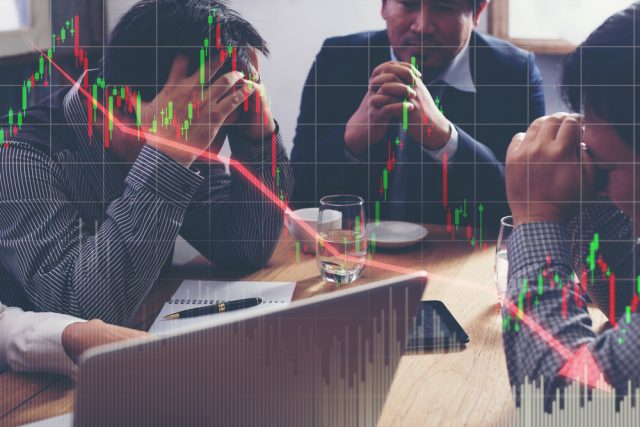Microeconomic Indicator in FOREX
Bankruptcy
What does Bankruptcy mean?
Bankruptcy is the legal procedure adopted for dissolving a business or an asset owned by an individual who fails to pay his loans out of his current earnings. Bankruptcy can be an insolvent debtor AKA. Voluntary liquidation or it can be forced upon by the law.
Current Laws of Bankruptcy aims at a couple of essential things. One is the appropriate arrangement of the legal assets of the lenders through equal distribution of defaulter’s assets, and the second is to give the defaulter a chance for a fresh start. Bankruptcy is generally considered as a business failure, but the closing down of the company is not.
How does Bankruptcy work?
Bankruptcy generally occurs due to some bad losses faced by the individuals and business owners. Most of them are not aware of it; hence, they do not go before a court filing for the same.
This is how it exactly works. Before applying for bankruptcy, one has to be sure that all the available options have been tried and there was no solution for repayment. Making a document of the above-tried methods which act as a proof for the incapability to pay off to the creditors is the first step in filing for bankruptcy. After filing, suitable paperwork is carried out, and the declaration is made before the court, that debt cannot be paid. Eventually, the person will be forgiven of his debts and liquidate his/her assets.
How does Bankruptcy affect the economy?
Practically, the bankruptcy system is made to benefit the economy. Bankruptcy helps the debtors by making provisions in settling their debts, which will directly create more borrowing and spending.
From a consumer point of view, it means that they are using more credit cards or mortgages to buy goods and make purchases on durable goods like cars or real estate. For a business perspective, the owner shall take higher risk by investing in R&D and raw materials to expand.
If the debts are not legally forgiven, then there will be no motivation for the debtor to clear off his loans. On the other hand, Bankruptcy laws also give the lenders an equal chance in trying to recover all of their money by liquidating the borrower’s collateral property.
Company & Consumer Bankruptcy
Bankruptcy is always bad for an economy, especially when it happens in a group. The increasing bankruptcy rate is an early indication for a significant economic downfall. It triggers speculation among the angel investors and banks as they are more worried about lending money. This can lead to economic depression. For instance, a significant rise in bankruptcy reduces consumer confidence, and they start spending less. This increases the cash holding among the public, which negatively affects the economy.
The consumer-driven economies are affected the most by this as a significant chunk of their economy is driven by consumer spending. For example, almost 70% of the U.S. economy is driven by consumer spending alone.
As a consequence, the corporates start to experience reduced profits, which will have a direct impact on institutional investments, employment, wage freezes, job layoffs, etc. All of these factors combined will eventually result in the nation’s economic turndown. But because the corporates have well-equipped systems and practices in place to handle such problems, corporate bankruptcy is rare to happen.
While the individual consumer bankruptcy as a whole has adverse effects on the economy, the bankruptcy of a single wealthy individual who is a citizen of a country is very negligible. The only type of bankruptcy, which is a severe concern, is the corporate bankruptcy as many large companies are involved.
One of the major global companies, General Motors (GM), came under bankruptcy during the recession period of 2008. This company had employed a lot of daily workers and also had a considerable share in the economy. It even had corporate debts that were widely in mutual funds, pension funds, and other banks. If GM fails to repay this debt, it would have led to mass layoffs and lower industrial output. Generally,
It is believed that individuals benefit more from liquidation than the corporate companies, but the bankruptcy laws allow the restructuring of a company than taking the liquidation path. This helped GM in recovering from the bankruptcy state.
Bankruptcy law model
The new Bankruptcy law of 2009 by the Federal Bank made several reforms. According to this law, debtors cannot be forgiven of their loans completely if they filed bankruptcy and will still be liable to pay their debts. Instead of completely releasing the individuals from the burden of their debts, they are asked to make monthly payments as per their capacity to the insolvent lenders. This prevents the slowing down of the economy.
Reliable sources of information on ‘Bankruptcy’ for Major currencies
The information on bankruptcy can be collected from an accountant, bankruptcy attorney, or investment advisor. The World Bank press release also publishes this information. However, there are other economics oriented websites that track this data. You can see that information by following the sources below.
USD- https://tradingeconomics.com/united-states/bankruptcies
AUD- https://tradingeconomics.com/australia/bankruptcies
CHF- https://tradingeconomics.com/switzerland/bankruptcies
GBP- https://tradingeconomics.com/united-kingdom/bankruptcies
CAD- https://tradingeconomics.com/canada/bankruptcies
JPY- https://tradingeconomics.com/japan/bankruptcies
NZD- https://tradingeconomics.com/new-zealand/external-debt
EUR (Italy)- https://tradingeconomics.com/italy/bankruptcies
EUR(Germany)- https://tradingeconomics.com/germany/bankruptcies
EUR(France)- https://tradingeconomics.com/france/bankruptcies
EUR(Spain)- https://tradingeconomics.com/spain/bankruptcies
What do traders care about Bankruptcy and its impact on the currency?
As we discussed earlier, an increased bankruptcy rate is a negative sign for a country’s economy. International investors and foreign banks are more concerned and reluctant about lending their funds to the countries that have high bankruptcy rates. This will weaken the value of the currency, and it eventually depreciates. So traders tend to look at the bankruptcy rate of a country before holding that country’s currencies for long term investments.





